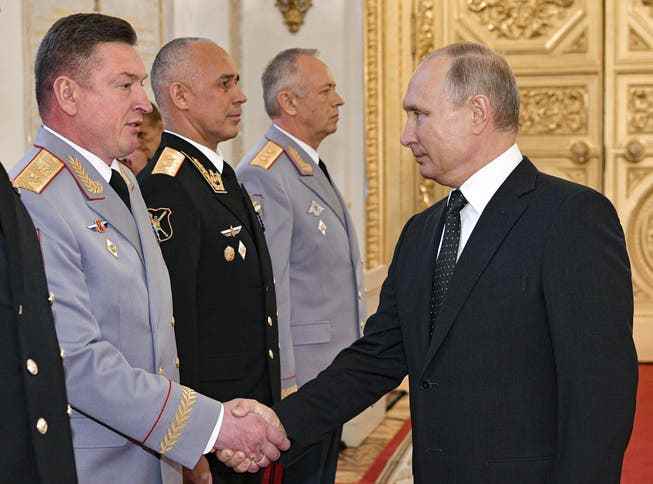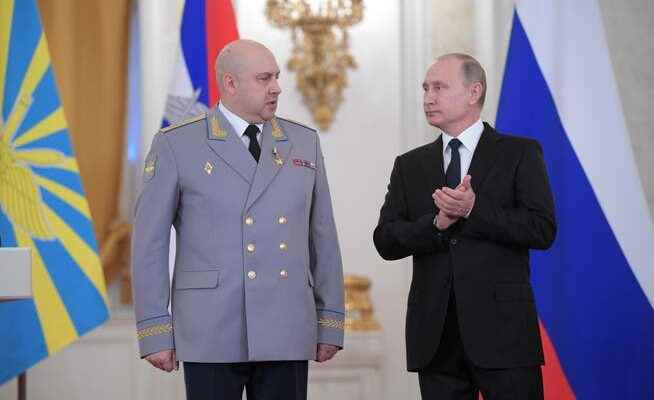The appointment of General Sergei Surovikin as Russia’s supreme commander in Ukraine has sparked speculation of even more brutal warfare. However, Surovikin’s rise hardly signifies a change of course, but rather reflects intrigues in Moscow.
General Sergei Surovikin at a ceremony in 2017 where President Vladimir Putin honored him for his role in the Syrian war.
Dvornikov, Zhidko, and now Surovikin: the list of Russian generals in supreme command of the invading forces in Ukraine keeps growing. What is new about the recent appointment, however, is that it was officially announced at all. The Ministry of Defense in Moscow often keeps secrets about personnel issues; Even the dismissal of highly decorated generals sometimes only becomes known to the public by chance.
Now, however, it has been officially confirmed for the first time that the position of “commander of the combined force group in the area of conducting the military special operation” exists and that this is the responsibility of the head of the Russian Air Force, Army General Sergei Surovikin. The constantly changing command structures on the Russian side have amazed observers since the beginning of the war. In the first phase, there was apparently a complete lack of a unified high command in the operational area, which led to an uncoordinated approach by the various regional commanders.
Month-long line-up changes
At the beginning of April, however, Western intelligence services found indications that the head of the southern military district, General Alexander Dwornikov, had assumed a central role. However, Dwornikov held this position for less than two months and has since been considered missing. Colonel-General Gennady Schidko is said to have replaced him at the end of May. But Schidko also quickly disappeared from the scene, which may have something to do with his lack of military successes. Only now, with the appointment of Surovikin, is there a somewhat clearer picture of the leadership structures.
The fact that this 56-year-old general was chosen corresponds to both military and political logic. At the outset of the invasion, prominent roles had been played by the chiefs of the four military districts, West, South, Center and East, and the commander of the Black Sea Fleet. However, they were all dismissed for their embarrassing performance, with one exception: the longtime head of the central military district, Colonel-General Alexander Lapin, was able to hold on and clearly enjoys President Putin’s favor. In June, Lapin was also given responsibility for the severely weakened troops of the Western Military District.

Alexander Lapin (left) at a 2018 ceremony with President Putin at the Kremlin.
Lapin only had a rival in Surovikin, who took over the orphaned leadership of the southern military district in the summer. Surovikin is a notch higher in rank than Lapin, who is only a three-star general, but that hardly mattered now. Rather, it was the tug of war on the “home front” or, more precisely, behind the scenes in Moscow that was decisive. To all appearances, Lapin and Surovikin became the favorites of two opposing camps. While Lapin is a protégé of Chief of Staff Valeri Gerasimov and thus personifies the status quo, the nationalist hardliners who are pushing for “total war” discovered their hope in Surovikin.
Enthusiastic ultranationalists
Of course, Surovikin is also a scion of the traditional military establishment. Like Lapin, he used to command a regional military district — those in the Far East — and for a time ran the Russian contingent of troops in Syria, which is now a part of the career of any ambitious general. But there are details in his biography that impress the ultra-nationalists who resent the military leadership. So Surovikin broke normal career paths when Putin put him, an army officer, at the head of the aerospace forces five years ago.
The bald, beefy general also has the image of a brutal general—exactly the profile hardliners want to lead Ukraine operations. He has the right name for this, because it contains the Russian word for “rough” or “tough”. A number of occurrences in his career indicate that Surovikin indeed is. In 1991, as a young captain, he commanded a company that clashed with pro-democracy demonstrators during the putsch of orthodox communists against the Soviet leadership; three people lost their lives. In 2004, as division commander, he yelled at one of his deputies so violently that he shot himself in the head shortly afterwards. A lawsuit from another subordinate, whom Surovikin is said to have beaten, is also on record from the same year.
This man is therefore very much to the liking of the hardliners in Moscow. The notorious head of the Wagner paramilitary force, Yevgeny Prigozhin, called Surovikin the most capable general in the army, while the Chechen leader Ramzan Kadyrov enthusiastically praised his “vision” and experience. Applause also came from the influential camp of military bloggers; one of these prophesied a head-rolling in the army, since Surovikin would not quibble with incompetent officers.
Concession by Putin – but for how long?
The appointment of this general, like the partial mobilization and annexation of the occupied territories, is an example of the concessions Putin has to make to the radical war party. However, it is by no means certain that warfare will become more brutal under Surovikin, as many media speculate. It should not be forgotten that his predecessor, Dwornikov, was already known as the «butcher of Syria» and that the Russian generals generally show absolute unscrupulousness towards the Ukrainian civilian population.
Rather, the decisive question is whether the new commander can bring about a turnaround in favor of the beleaguered invading troops. There is nothing to indicate that Surovikin, as commander of the Southern Group in Ukraine, would have shown exceptional talent. American military expert Michael Kofman argues that even the best officer in the world could not bridge the gap between Putin’s unrealistic goals and the army’s available resources.
In this respect, Surovikin’s promotion to what is probably the most thankless post in the Russian military hierarchy is certainly not the last chapter in the epic of Kremlin intrigues. Many a rival may secretly calculate that the impetuous climber will be brought to failure in this way.
